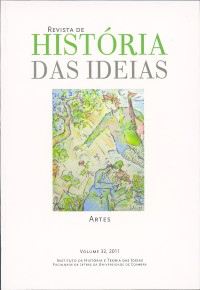Please use this identifier to cite or link to this item:
https://hdl.handle.net/10316.2/41405| DC Field | Value | Language |
|---|---|---|
| dc.contributor.author | Cunha, Norberto Ferreira da | - |
| dc.date.accessioned | 2017-04-24T22:48:01Z | |
| dc.date.accessioned | 2020-09-30T11:27:32Z | - |
| dc.date.available | 2017-04-24T22:48:01Z | |
| dc.date.available | 2020-09-30T11:27:32Z | - |
| dc.date.issued | 2011 | - |
| dc.identifier.issn | 0870-0958 | - |
| dc.identifier.issn | 2183-8925 (digital) | - |
| dc.identifier.uri | https://hdl.handle.net/10316.2/41405 | - |
| dc.description.abstract | A crítica permanente às "filosofias de identidade", em crise desde o século XVI, permitiu a emergência de uma nova forma de escrita, antropocêntrica, centrada no "eu" - o ensaio - que teve o seu início com Montaigne. A contingência e precariedade do "eu", a sua incomensurabilidade, conduziram a uma forma de expressão "experimental", solitária, anti-dogmática, dubitativa e céptica, assistemática, hostil à lógica discursiva (tanto indutiva como dedutiva) optando, em contrapartida, pela escrita descontínua, finita, fragmentária e inacabada, que privilegia os processos e não os resultados. Ora esta forma do ensaio, sem renunciar ao conhecimento da realidade - o ensaio não ficciona - deslocou, contudo, esse conhecimento para o concreto imediato e polissémico - que irrompe, informe, no "eu" - e a verdade para a intertextualidade. Esta deslocação, colocou, contudo, vários problemas: o método do ensaio (que não sendo alógico, recusa, contudo, o pressuposto do das ciências, ou seja, a correspondência entre a ordo idearum e a ordo rerum, que tem o seu protótipo nas "regras do método" de Descartes); as relações do ensaio com a retórica (cujas "figuras" recusa, como auxiliares da argumentação), com o leitor (interactividade dialógica, solicitada pela dúvida quase pirrónica em que o ensaísta se coloca), com a obra de arte (Lukács) e com a ciência (Adorno). Mas ainda que, actualmente, se reconheça autonomia formal ao ensaio e se saiba que não é uma obra de arte (a não ser na sua atitude perante a vida) nem uma obra científica (não recorre à indução nem à dedução), o seu género continua indefinível, revelando-se, a sua definição genérica, em última instância, uma questão onto-filosófica. | por |
| dc.description.abstract | The permanent critic of the "philosophies of identity", in crisis since XVI century, allowed the emergence of a new form of writing, anthropocentric, centered in the "I" - the essay - and begun with Montaigne. The contingence, the precariousness and the incommensurability of the "I" led to an experimental form of expression, solitary, anti-dogmatic, dubitative and skeptical, asystematic, hostile to the discursive logic (whether it is inductive or deductive), choosing, in revenge, a discontinuous, finite, fragmentary and unfinished writing, which privileges processes and not results. Hence, this form of essay, without rejecting the knowledge of reality - the essay doesn't build fictions - has dislocated, however, that knowledge to the immediate and polysémie concrete - that breaks out, shapeless, in the "I" - and the truth to intertextuality. This dislocation, raised, despite this, various problems: the teaching method (which, not being a-logic, refuses, though, the scientific principle - the correspondence between a ordo idearum and a ordo rerum, that has in its prototype in the "rules of the method" of Descartes); the relationship between essay and rhetoric (whose "figures" it declines, as argumentative auxiliaries), the reader (dialogical interactivity, requested by the almost pirronic doubt of the essayist), the work of art (Lukács) and the science (Adorno). And even though the formal autonomy of the essay is recognized, as well as the assumption that it is not a work of art (except in its attitude towards life) nor a work of science (it does not convoke induction nor deduction), its genre remains indefinable, revealing its genre definition as an onto-philosophical question. | eng |
| dc.language.iso | por | - |
| dc.publisher | Imprensa da Universidade de Coimbra | - |
| dc.rights | open access | - |
| dc.title | A arte do ensaio: a vocação socrática de Proteu | por |
| dc.title.alternative | The Art of essay: the socratic vocation of Proteus | por |
| dc.type | article | - |
| uc.publication.collection | Revista de História das Ideias vol. 32 | - |
| uc.publication.firstPage | 569 | - |
| uc.publication.lastPage | 598 | - |
| uc.publication.location | Coimbra | - |
| uc.publication.journalTitle | Revista de História das Ideias | - |
| uc.publication.volume | 32 | por |
| dc.identifier.doi | 10.14195/2183-8925_32_21 | - |
| uc.publication.orderno | 22 | - |
| uc.publication.area | Artes e Humanidades | - |
| uc.publication.manifest | https://dl.uc.pt/json/iiif/10316.2/41405/248833/manifest?manifest=/json/iiif/10316.2/41405/248833/manifest | - |
| uc.publication.thumbnail | https://dl.uc.pt/retrieve/11872702 | - |
| item.grantfulltext | open | - |
| item.fulltext | With Fulltext | - |
| Appears in Collections: | Revista de História das Ideias | |
Files in This Item:
| File | Description | Size | Format | |
|---|---|---|---|---|
| a_arte_do_ensaio.pdf | 389.31 kB | Adobe PDF |  |
Items in DSpace are protected by copyright, with all rights reserved, unless otherwise indicated.
